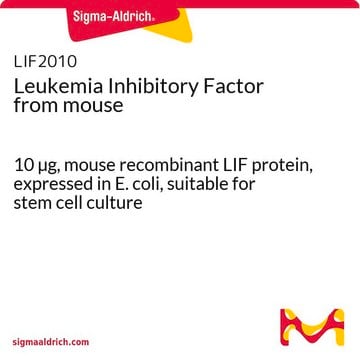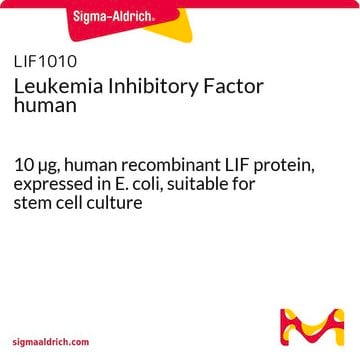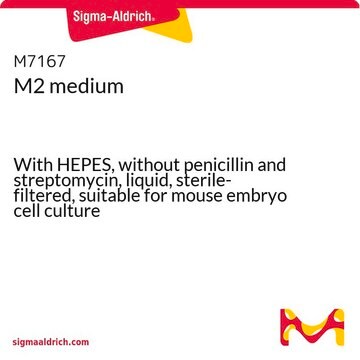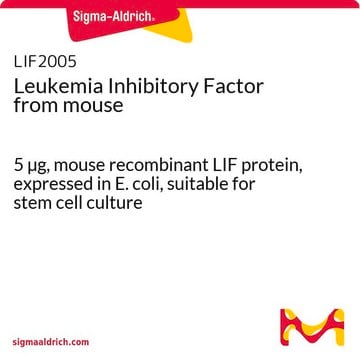ESG2206
ESGRO® Recombinant Rat LIF Protein
ESGRO Leukemia Inhibitory Factor (LIF) supplement for rat ES cell culture. Each vial contains 10^6 units/ml
Synonyme(s) :
Rat LIF
About This Item
Produits recommandés
Niveau de qualité
Pureté
>85% (active component rat LIF (rtLIF), SDS-PAGE)
Forme
liquid
Fabricant/nom de marque
Chemicon®
Concentration
1000000 units/mL
Technique(s)
cell culture | stem cell: suitable
Entrée
sample type induced pluripotent stem cell(s)
sample type: mouse embryonic stem cell(s)
Numéro d'accès UniProt
Conditions d'expédition
dry ice
Description générale
Application
Rat ES Cells: RtLIF produced from a transfected cell line, has been shown to effectively maintain the undifferentiated phenotype of rat ES cells when used at a concentration of 1000-1500 units / mL (Takahama et.al. 1998).
At this recommended concentration 106 units of ESGRO is sufficient for 1L of tissue culture media.
Visit www.esgro-lif.com for additional information
Rat LIF is not available for resale.
For research use only; not for use as a diagnostic.
Conditionnement
Qualité
Attention
Forme physique
Rat ESGRO is supplied 0.22 micron sterile filtered, and tested negative for mycoplasma.
Stockage et stabilité
For long term storage it is recommended that Rat ESGRO concentrate be stored at -20°C.
It is recommended that prior to use, Rat ESGRO should be diluted in sterile tissue culture media and aliquoted to a convenient concentration, then stored at -20°C. Freeze thawing will reduce potency and is not recommended.
Remarque sur l'analyse
Informations légales
Clause de non-responsabilité
Code de la classe de stockage
10 - Combustible liquids
Classe de danger pour l'eau (WGK)
WGK 2
Certificats d'analyse (COA)
Recherchez un Certificats d'analyse (COA) en saisissant le numéro de lot du produit. Les numéros de lot figurent sur l'étiquette du produit après les mots "Lot" ou "Batch".
Déjà en possession de ce produit ?
Retrouvez la documentation relative aux produits que vous avez récemment achetés dans la Bibliothèque de documents.
Notre équipe de scientifiques dispose d'une expérience dans tous les secteurs de la recherche, notamment en sciences de la vie, science des matériaux, synthèse chimique, chromatographie, analyse et dans de nombreux autres domaines..
Contacter notre Service technique








